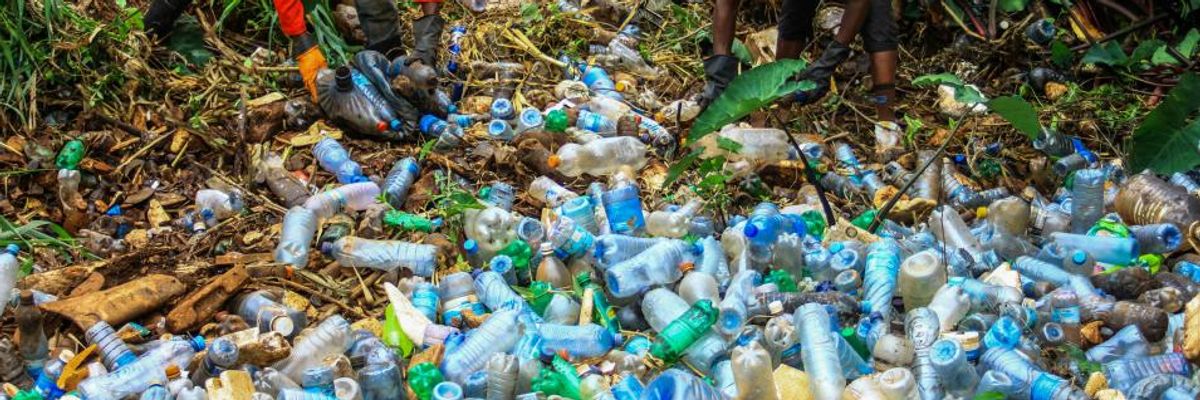Green groups responded with alarm to Sunday reporting by the New York Times and Unearthed that a U.S.-based trade group for major chemical and fossil fuel companies has lobbied the Trump administration during the Covid-19 pandemic to use a forthcoming trade agreement to flood the African continent with plastics.
U.S. Trade Representative Robert Lighthizer and Kenya Cabinet Secretary for Industrialization, Trade, and Enterprise Development Betty Maina launched trade negotiations in July. The new reports shed light on the lobbying efforts of the American Chemistry Council (ACC), whose members include the petrochemical operations of the oil giants Chevron, ExxonMobil, and Shell as well as chemical companies such as Dow and DuPont.
"This reads like a diabolical nightmare, which I guess it actually is."
--Danny Rivero, reporter
The ACC "is lobbying to influence United States trade negotiations with Kenya, one of Africa's biggest economies, to reverse its strict limits on plastics--including a tough plastic-bag ban. It is also pressing for Kenya to continue importing foreign plastic garbage, a practice it has pledged to limit," the Times reported, citing documents obtained via public records request by Unearthed, Greenpeace U.K.'s investigative journalism platform.
Radio presenter Mike Finnerty called the Times report "a sobering read" while WLRN reporter Danny Rivero said that "this reads like a diabolical nightmare, which I guess it actually is." Climate advocates and political candidates also weighed in.
The U.S.-based, youth-led Sunrise Movement said in reponse to the reporting that "apparently Big Oil can't let their industry die without trying to drag down African countries with it."
"Is there no end to Big Oil's evil?" tweeted 350.org.
Author and activist Bill McKibben, who co-founded the environmental advocacy group, declared: "This is evil on so many levels it's hard to know where to start."
Even before negotiations between the Trump administration and Kenya's government officially kicked off, Ed Brzytwa, director of international trade for the ACC, wrote in an April 28 letter to the Office of the U.S. Trade Representative, "We anticipate that Kenya could serve in the future as a hub for supplying U.S.-made chemicals and plastics to other markets in Africa through this trade agreement."
That message--along with opposition to waste trade rules under an international treaty called the Basel Convention--was echoed in an ACC letter to the U.S. International Trade Commission, according to Unearthed. An ACC spokesperson told the Greenpeace affiliate the trade group is concerned the Basel restrictions "could very well limit the ability of African and other developing countries to properly manage plastic waste" by restricting their capacity to export materials abroad.
Some ACC members joined with consumer goods, recycling, and waste management firms in early 2019 to launch the Alliance to End Plastic Waste. The companies involved have collectively committed $1.5 billion to reduce plastic waste and improve recycling, especially in developing countries. Greenpeace has called the effort "a desperate attempt from corporate polluters to maintain the status quo on plastics."
Noting the alliance, Unearthed revealed that the ACC wrote in its letters to U.S. trade entities that "there is a global need to support infrastructure development to collect, sort, recycle, and process used plastics, particularly in developing countries such as Kenya." The group claimed "such infrastructure will create opportunities for trade and investment and help keep used plastics out of the environment."
"Making public statements about ending plastic pollution while quietly lobbying to allow Africa to be used as a plastic dumping ground is next level hypocrisy and greenwashing."
--Kate Melges, Greenpeace USA
Environmentalists in Kenya and across the globe are worried about the long-term consequences if the trade agreement results in more plastic entering their country.
"As a country we have made strides to reduce the plastics that are used here, and which end up as waste--there is a ban on use and manufacture of carrier bags and recently a ban on plastic in protected areas--so this trade deal would diminish what we have achieved as a country," Dorothy Otieno of the Centre for Environment, Justice, and Development (CEJAD) in Kenya told Unearthed.
Otieno, CEJAD's plastics program coordinator, raised concern about the impact of more plastic waste, explaining that "some will be reused and recycled but the majority will end up in dump sites. We will end up in a situation where Kenya will become a dump site for plastic waste."
"It clogs our waterways and our drainage systems and leads to flooding. We also see the effect of pollution from the burning of plastics--it produces dioxins and furans that lead to respiratory diseases," she said. "Somebody can burn these wastes right next to your house and suffer the impacts. We also see the aesthetic value of our towns being reduced because of plastics."
The Kenyan environmentalist's concerns were shared by Greenpeace USA senior plastics campaigner Kate Melges and Greenpeace Africa senior political adviser Fredrick Njehu, who responded to the reports in a statement Monday.
"Africa is at the forefront of the war on plastics, with 34 out of 54 countries having adopted some regulation to phase out single-use plastic," said Njehu. "The Kenyan government should not backslide on the progress made in its plastic-free ambitions by folding to pressure from fossil fuel giants, because it stands to derail the progress made across the entire continent."
Melges said that "it is shameful but not surprising that struggling fossil fuel giants are lobbying for an expansion of their polluting plastic footprint into the African continent to keep their profits flowing."
"These companies hope to continue dumping single-use plastics on communities around the globe, despite their known impacts to the environment and public health," she added. "Making public statements about ending plastic pollution while quietly lobbying to allow Africa to be used as a plastic dumping ground is next level hypocrisy and greenwashing."
